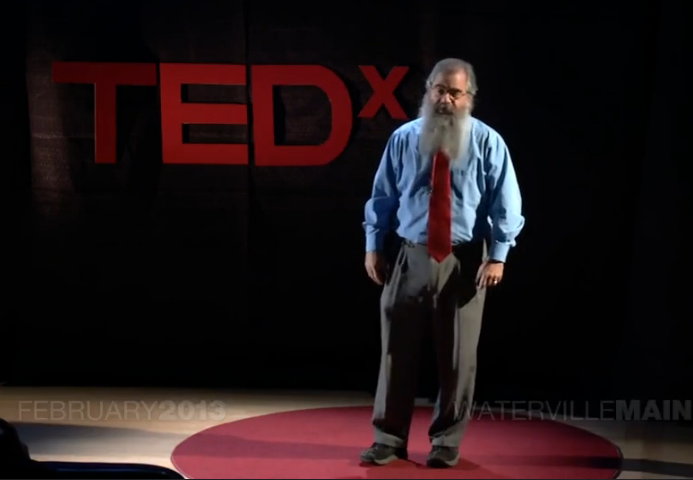My name is Dan Cohen, and I am academic, as he said.
我叫丹·科恩,我是個學者,就像主持人介紹的。
And what that means is that I argue.
這意味著我經常需要辯論。
It's an important part of my life, and I like to argue.
這是我生命中的重要組成部分,同時我喜歡辯論。
And I'm not just an academic, I'm a philosopher,
我不僅僅是個學者,我也是個哲學家,
so I like to think that I'm actually pretty good at arguing.
所以我覺得是實際上還是挺擅長辯論的。
But I also like to think a lot about arguing.
但是我也經常思考有關辯論的問題。
And thinking about arguing, I've come across some puzzles,
說起辯論,我曾有過一些困惑,
and one of the puzzles is that
而其中一個困惑是
as I've been thinking about arguing over the years,
我多年前開始考慮如何辯論
and it's been decades now, I've gotten better at arguing,
至今已有二十多年了,我也變得更善于辯論,
but the more that I argue and the better I get at arguing, the more that I lose.
但是越是辯論,我就能從中獲取更多,同時也失去更多。

And that's a puzzle.
這就是一個困惑。
And the other puzzle is that I'm actually okay with that.
而另一個困惑就是我其實覺得這沒什么大不了的。
Why is it that I'm okay with losing
為什么我會覺得失去一些什么也無關緊要,
and why is it that I think that good arguers are actually better at losing?
為什么好的辯論者實際上更善于失去?
Well, there's some other puzzles.
好了,其實我還有以下其他困惑。
One is, why do we argue? Who benefits from arguments?
例如,我們為什么辯論?而誰又從辯論中獲益?
And when I think about arguments now, I'm talking about,
需要指出的是當我談及辯論時,我所指的,
let's call them academic arguments or cognitive arguments,
是所謂學術辯論亦或者認知辯論,
where something cognitive is at stake.
就一些我們知之甚少的方面進行辯論。
Is this proposition true? Is this theory a good theory?
例如我們的認知是否正確?這個理論是不是個好理論?
Is this a viable interpretation of the data or the text?
對于某些數據或者文字這是不是一個很好的解釋?
And so on. I'm not interested really in arguments about
以及很多其他的問題。我無心去爭論
whose turn it is to do the dishes or who has to take out the garbage.
今天該誰洗碗或者誰應該倒垃圾。
Yeah, we have those arguments too.
當然,我們也會為那些問題爭論。
I tend to win those arguments, because I know the tricks.
我經常在那類爭論爭論中勝出,因為我知道一些技巧。
But those aren't the important arguments.
當時那些辯論沒有那么重要。
I'm interested in academic arguments today, and here are the things that puzzle me.
我感興趣的是那些學術性辯論,而接下來這是我感到困惑的事情。
First, what do good arguers win when they win an argument?
首先,當人們贏得一場辯論的時候,作為一個優秀的辯論者,他從中學到了什么
What do I win if I convince you that
如果我能說服你
utilitarianism isn't really the right framework for thinking about ethical theories?
實用主義不能用來解釋道德理論的話,我能從中獲得什么呢?
So what do we win when we win an argument?
所以我們到底可以從一場辯論中學到什么?
Even before that, what does it matter to me
而且在此之前,
whether you have this idea that Kant's theory works or Mill's the right ethicist to follow?
你是追隨康德還是密爾又有跟我什么關系呢?
It's no skin off my back whether you think functionalism is a viable theory of mind.
無論你是否認為功能主義是一個可取的思維方式,都對我沒有什么影響。
So why do we even try to argue?
所以我們為什么會想去辯論?
Why do we try to convince other people to believe things that they don't want to believe?
為什么我們要去說服別人相信那些他們不愿相信的事情?
And is that even a nice thing to do?
我們到底應不應該這么做?
Is that a nice way to treat another human being,
用這種方式去對待他人,
try and make them think something they don't want to think?
迫使他們去思考一些他們不想去思考的東西?











